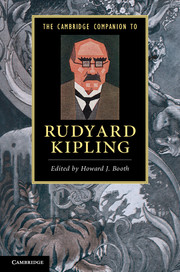Book contents
- Frontmatter
- Introduction
- 1 Kipling and the fin-de-siécle
- 2 India and empire
- 3 Kipling’s very special relationship: Kipling in America, America in Kipling
- 4 Science and technology
- 5 Kipling and gender
- 6 Kipling and war
- 7 Kipling as a children's writer and the Jungle Books
- 8 'Nine and sixty ways’: Kipling, ventriloquist poet
- 9 Kim
- 10 The later short fiction
- 11 Kipling and postcolonial literature
- 12 Kipling and the visual: illustrations and adaptations
- 13 Reading Kipling in India
- Further reading
- Index
11 - Kipling and postcolonial literature
Published online by Cambridge University Press: 28 September 2011
- Frontmatter
- Introduction
- 1 Kipling and the fin-de-siécle
- 2 India and empire
- 3 Kipling’s very special relationship: Kipling in America, America in Kipling
- 4 Science and technology
- 5 Kipling and gender
- 6 Kipling and war
- 7 Kipling as a children's writer and the Jungle Books
- 8 'Nine and sixty ways’: Kipling, ventriloquist poet
- 9 Kim
- 10 The later short fiction
- 11 Kipling and postcolonial literature
- 12 Kipling and the visual: illustrations and adaptations
- 13 Reading Kipling in India
- Further reading
- Index
Summary
Insofar as postcolonialism is so often used as a synonym for anti-colonialism, one might infer that the relationship between the terms in my title is one of binary opposition rather than negotiation or conjunction. In such a reading (which will be contested in due course), Kipling might be understood simply as a figure whom later non-western writers engage with only to dismiss. There is certainly evidence to support such a reading. Given his long association with India, hostility towards Kipling is, understandably perhaps, especially apparent in the subcontinent and its diasporas, with Kim and The Jungle Books - the main focus of the discussion below - often identified by critics as embodying the most demeaning properties of colonial discourse.
Antipathy to Kipling is perhaps most widely evident amongst later South Asian writers with explicitly nationalist sympathies. An early example of such antipathy is Sarath Kumar Ghosh's epic novel The Prince of Destiny (1909). While never explicitly named, Kipling and his supposed imperial politics are recurrently the object of biting commentary, notably in the denunciations made by the protagonist Barath and his friend Naren, who complains: 'For twenty years [the banjo-poet] and his hundred imitators ... who write of India by his inspiration, have abused us and insulted us most deeply.'
- Type
- Chapter
- Information
- The Cambridge Companion to Rudyard Kipling , pp. 155 - 168Publisher: Cambridge University PressPrint publication year: 2011
- 3
- Cited by



